When the
BBC?s
new Television Centre opened in London in June 1960, just 0.75 km from the
old studios, it had one of the best-equipped puppet
theatres in the world. This was where the later ?Rubovia? films and
other puppet stories were made for children?s television.
Each play lasted about 20
minutes, and took anywhere from six to eight weeks to complete. Practically everything
in the theatre was
miniature, about one-third full size. Tables, chairs, pianos, trees, doors,
and all manner of other things were all constructed on the spot. Stage sets were made of a
featherweight plastic foam sheeting which, when suitably treated, could be
made to look like wood, brick, stone,
or plaster. Trees were made of corrugated cardboard covered with
plaster, and then painted to look like the real thing.
The puppets were marionettes,
operated from an overhead steel ?bridge? using a control of Gordon
Murray's own design (see Puppets
section). Foam latex rubber, plastic, wood, glue, wire, lead and
various textiles were used to make the two-foot high puppet characters.
|
|
|
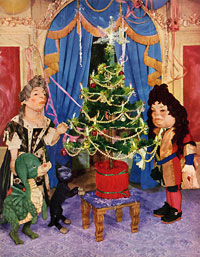
(click for
larger image 151K)
|
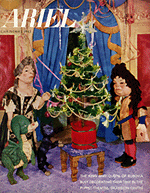 The
King and Queen of Rubovia as never seen on the front cover of the Christmas
1962 edition of Ariel, the BBC's house magazine! The actual Ariel
cover, shown at right, has the following caption: The King and Queen of Rubovia
busy decorating their tree in the Puppet Theatre, Television Centre. The
King and Queen of Rubovia as never seen on the front cover of the Christmas
1962 edition of Ariel, the BBC's house magazine! The actual Ariel
cover, shown at right, has the following caption: The King and Queen of Rubovia
busy decorating their tree in the Puppet Theatre, Television Centre.
Point of Interest: This issue of Ariel also has a short article
written by Gordon Murray (see Printed Media section).
|
|
|
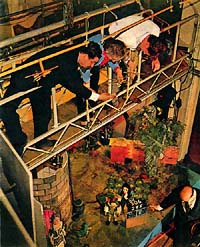
(click for larger
image 105K)
|
All is set to film a scene from the
"Rubovian Legends" play, Bees and Bellows, at the BBC?s puppet theatre in
the new Television Centre, early 1962.
Gordon Murray is positioning the clapper board for a ?take.? The
puppeteers (L to R) are: Bob Bura (Pongo), Audrey Atterbury (Weatherspoon)
and John Hardwick (the Lord Chamberlain).
The dialogue
was
pre-recorded in a sound studio, and the tape played back during filming, with the puppeteers pulling strings to make the necessary
gestures and mouth movements in synch with the sound. Sound effects and
music were added later.
Points of Interest: If you look carefully at the bottom edge of the
picture, you can see the top of puss's head. Another photograph taken from
a different angle shows that the queen is actually not appearing in this
scene, but is instead hanging from her control, out of view of the film camera, two
feet up above the stage! Notice that her control is hanging on a hook,
higher up than the controls in the puppeteers' hands.
This picture originally appeared in
the article, The
Tiny World of Puppets, Look and Learn magazine
#38, 6th October 1962. Photograph by Rosemary
Mathews. Look and Learn was published by Fleetway
Publications Ltd. |
|
|
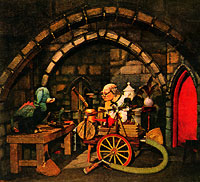
(click for larger
image 140K)
|
A scene
from the "Rubovian Legends" play, Bees and Bellows,
first transmitted 2nd October, 1962. Seen here as it was never
shown on television?in
glorious colour.
Mr. Weatherspoon works on his newly invented steam-driven vacuum cleaner,
watched by Pongo the Queen?s baby dragon, and Rubina his cat
('puss').
Point of Interest: Careful examination of a hi-resolution scan of
this picture revealed a faint image of Weatherspoon's cat 'puss' sitting
beside Pongo. For reasons unknown, perhaps due to damage on the original
print, puss was partially retouched out. Puss's image has been partially
restored here to gain a better idea of what the picture might have looked
like.
This picture
originally appeared in the article, The
Tiny World of Puppets, Look and Learn magazine #38, 6th
October 1962. Photograph by Rosemary Mathews. Look and Learn was
published by Fleetway Publications Ltd. |
|
|
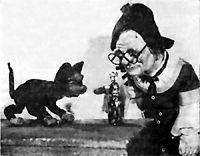
(click for larger
image 49K)
|
A
publicity still
from Spray Fever, first transmitted 9th August, 1960, and the
first "Rubovian Legends" play to be produced in the new
BBC Puppet Theatre, at the new Television Centre in Shepherd's Bush, West
London.
Mr. Weatherspoon is showing Rubina how his magic scent
sprayer works.
Point of Interest: The four-inch tall perfume bottle in this scene
appears to be in the shape of a mustached soldier wearing a tall shiny
helmet and breastplate armour, perhaps modelled after that worn by 'Sir'
Albert Weatherspoon in his defence of the Kingdom in A Knight for a
Day. |
|
|
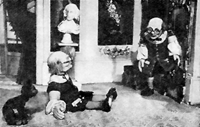
(click for larger
image 45K)
|
A
publicity still
from The Troublesome Double, first transmitted 3rd December,
1963.
Although very little is known about this episode, this picture
seems to show both Mr. Weatherspoon (sitting on the floor) and
'puss' being quite taken aback by the sudden emergence of
Weatherspoon's mirror-image "double" from a mirror in the
front room of Rubovia Castle.
Predictably, the "double" who is the product of some more
of Mr. Weatherspoon's wayward (but ultimately harmless) magic, turns
out to be trouble.
|
|
|
|
These
photographs originally appeared in Girl (companion to Eagle,
Swift and Robin; every Wednesday 5d), 17th March 1962 (Vol. 11, No. 11),
page 6, in an article entitled, "A Peep at Rubovia".
A full transcript of the article appears in the Printed Media
section of the website.
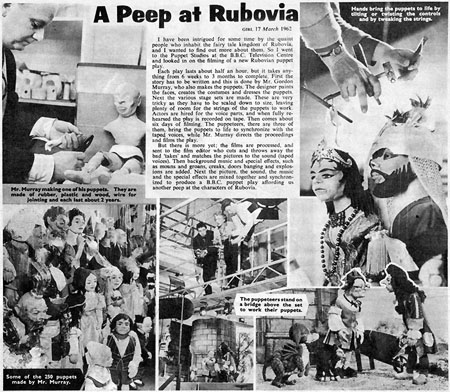
(click for larger
image 185K)
|
|
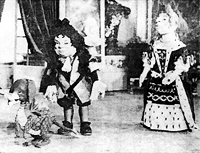
(click for larger
image 62K)
|
Publicity
still, episode unknown. Possibly Bees and Bellows, first transmitted 2nd
October 1962.
L-to-R: Pongo the
Queen's baby Chinese dragon, King Rufus of Rubovia, and Queen
Caroline of Rubovia. Front room, Rubovia Castle.
Published in The Age of the Puppet by Sylvia Haymon, The
Guardian, Women's Page (page 9), February 16, 1962.
|
|
|
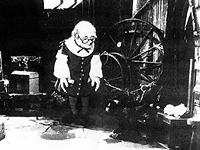
(click for larger
image 74K)
|
A
publicity still from Gala Performance, first transmitted 6th
November, 1962.
Mr. Weatherspoon
and his cat Rubina search the palace basement for fireworks.
|
|
|
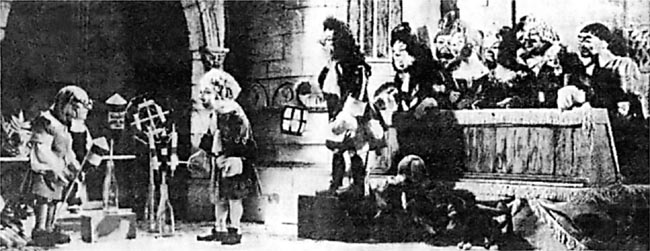
A scene from Gala Performance, first transmitted 6th November,
1962.
Mr. Weatherspoon & an assistant (Prince Rupert?) are lighting fireworks for
the assembled guests.
This photograph
originally appeared in Television Puppet Theatre, the Aug 1963 issue of
the London Calling, the BBC's Overseas Journal.

|
|
